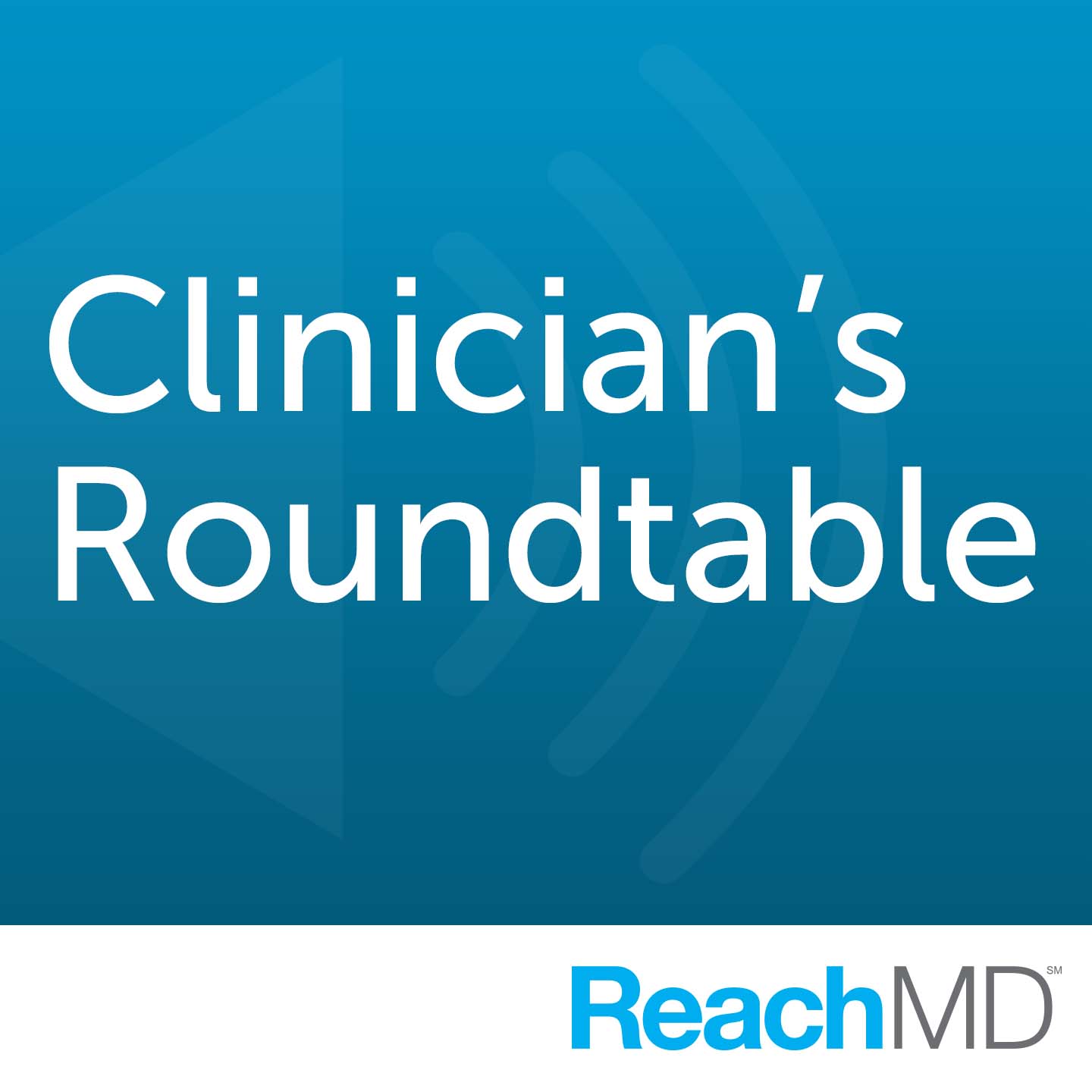

Clinician's Roundtable
ReachMD
Tune in to interviews with the top thought leaders in medicine exploring the clinical and professional issues that are foremost in the minds of the medical community. Join us at the Clinician's Roundtable for discussions on a vast range of topics that every medical professional should know about.
Episodes
Mentioned books

Sep 7, 2016 • 10min
Genital Herpes Simplex Infections: Typing, Diagnostic, and Treatment Strategies
Host: Ana Maria Rosario
Guest: David Gandell, MD
Genital Herpes Simplex Virus (HSV) infection is a major public health problem. A dramatic upsurge in genital HSV infections have been documented from several prominent studies, making recognition, treatment, and patient counseling strategies more important than ever. Joining host, Ana Rosario at the Women's Health Annual Visit in Deerborn, MI, is Dr. David Gandell, Clinical Professor of Obstetrics and Gynecology at the University of Rochester and attending phsyician at Strong Memorial Hospital.

Aug 29, 2016 • 12min
Caring for Extremely Preterm Infants Born at the Threshold of Viability
Host: Patrice L Basanta-Henry, MD, MHSc, FACOG
Approximately just 0.5% of all births occur before the third trimester of pregnancy, yet these very early deliveries result in the majority of neonatal deaths and more than 40% of infant deaths. Care for infants born at the threshold of viability, less than 24 weeks of gestation and with body weights less than 1000 grams, poses many difficult clinical, social, and ethical questions among clinicians and families. Host Dr. Patrice Basanta-Henry speaks with guest Dr. Fyama Wenner, a maternal-fetal medicine specialist at Atlanta Maternal Fetal Medicine, about special care considerations for extremely preterm infants, as well as effective counseling strategies for families.

Aug 29, 2016 • 22min
Patient Barriers to Accessing IUDs and Implants in Today's Contraceptive Market
Host: Ana Maria Rosario
Guest: Anita L. Nelson, MD
Joining host Ana Maria Rosario at the Women's Health Annual Visit in Deerborn, MI, is Dr. Anita Nelson, professor emeritus at UCLA and professor and chair of OB/GYN at Western University in California. The two discuss patient barriers to accessing IUDs and implants in a rapidly growing contraceptive market.

Aug 22, 2016 • 15min
Overcoming Practice Barriers for NPs Nationwide
Host: Renée Simone Yolanda Allen, MD, MHSc., FACOG
Mid-level providers such as nurse practitioners help fill gaps in health care coverage across the country. Yet while NPs have the ability to work independently in a variety of ways including administering treatments, providing consultations, and authorizing use of medical equipment, several practice barriers impede their efforts to provide highest quality care. Host Dr. Renee Allen chats with Patrick Washington, a board-certified nurse practitioner in Family Medicine, about the roles NPs play in the healthcare industry and ways to overcome practice obstacles in the era of health care reform.

Aug 22, 2016 • 20min
Opiate Addiction: Misconceptions about Medically-Assisted Treatments
Host: Shira Johnson, MD
Opiate addiction is rapidly becoming one of the biggest health crises in the United States today. Opiates have killed more than 28,000 people in 2014 and opioid deaths outnumber motor vehicle accidents and gunshot fatalities. Dr. Shira Johnson talks with Dr. Kenji Oyasu, the Executive Medical Director for Brightside Clinic in Northbrook, Illinois. They discuss common misconceptions about medically-assisted treatments for opiate addiction.

Aug 1, 2016 • 19min
Reducing the Culture of Stress, In and Out of Clinical Practice
Host: Matt Birnholz, MD
Today’s culture of stress is driving people to pharmaceuticals and other dangerous outlets as coping mechanisms. What strategies should people employ to mitigate stress and manage their time better? Host Dr. Matt Birnholz sits down with Dr. Patricia Sulak, Endowed Professor at Texas A&M University to talk about the dangers of stress.

Jul 25, 2016 • 16min
New Guidelines for Umbilical Cord Blood Banking
Host: Matt Birnholz, MD
The American Congress of Obstetricians and Gynecologists have made several recommendations regarding the practice of umbilical cord blood banking. Host Dr. Matt Birnholz speaks with Dr. Jordan Perlow, Associate Director of Maternal-Fetal Medicine at Banner Good Samaritan Medical Center in Phoenix, AZ, about the newest guidelines set forth from ACOG.

Jul 11, 2016 • 14min
Help for People with Gluten Sensitivities at Restaurants
Host: Matt Birnholz, MD
The simple act of going out to eat can be a tricky proposition for people dealing with gluten intolerance or sensitivity issues. A new portable device is aiming to help people with this problem by allowing them to test food’s gluten content and help find foods that they are able to eat. Host Dr. Matt Birnholz talks with guest Carla Borsoi, Vice President of Marketing at 6Sensor Labs, about how this device will assist people living with gluten intolerance or sensitivity issues.

Jul 4, 2016 • 13min
Nurse Practitioners: The New Vital Sign of Health Care?
Host: Renée Simone Yolanda Allen, MD, MHSc., FACOG
Midlevel providers help fill the gap in health care coverage across the country. Nurse practitioners, in particular, have the distinct capabilities to work independently in a variety of areas including consultations, treatments, and authorization of durable medical equipment. Host Dr. Renee Allen chats with Patrick Washington, a board-certified nurse practitioner in family medicine, about the role NPs play in the healthcare system, how education requirements are evolving, and where NP duties differ from those of physician assistants (PAs).

Jul 4, 2016 • 21min
Tracing the Rise of Integrated Medicine
Host: Matt Birnholz, MD
Integrative medicine is an approach to care that purports to address a more wholistic range of physical, emotional, mental, social, spiritual and environmental influences affecting a person’s health than traditional care models. How did this field come into prominence, and where is it headed? From the floors of the A4M Meeting in Las Vegas, Dr. Matt Birnholz talks with James LaValle, clinical pharmacist, nutritionist, and author, about the rise of integrated medicine and how clinicians are incorporating its principles in someone’s life.


